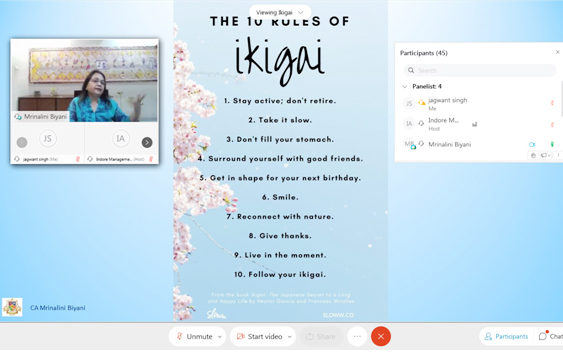Ikigai: The Japanese secret to a long and happy life

Indore Management Association organized Reader’s Clique, a webinar for management professionals & students on Saturday, September 26, 2020. The session featured a discussion on the book Ikigai: The Japanese secret to a long and happy life
The moderator of the session was CA Mrinalini Biyani.
Having 35 years’ post qualification experience in corporate sector in the areas of development of Management Information Systems and Internal Audits including Taxation. After clearing CA in the very first attempt at an early age, and standing as first female qualifying in India within the community; commenced career from Price Waterhouse, Mumbai and utilized the experience by setting up the practice in Indore as a first independent female practitioner.
Have shouldered the responsibilities as Secretary to the Indore Branch of Chartered Accountants of India for consecutive two years. Had an opportunity to work as financial co-ordinator in the Jury meet of several prominent industrialists; in connection with the Export Awards in the State of M.P. Presently working as a corporate consultant with the group of Companies. Have worked as visiting faculty to various management institutes in and around Indore.
An art lover and always interested in organizing and beautifying interiors and exteriors apart from planning layouts and decorating , landscaping, gardening , cooking, reading , painting , listening to music and allied activities. Can speak Hindi, English, Marathi and Marwari fluently.
Always interested in learning new things on spiritual platforms including Yoga. Interested in travelling and see the world’s best of creations.
Some of the key points of the session were:
What is Ikigai?
- In Japanese, ikigai is written by combining the symbols that mean “life” with “to be worthwhile.”
- “Translates roughly as ‘the happiness of always being busy.’
- “There is a passion inside you, a unique talent that gives meaning to your days and drives you to share the best of yourself until the very end. If you don’t know what your ikigai is yet, as Viktor Frankl says, your mission is to discover it.”
- “Our ikigai is different for all of us, but one thing we have in common is that we are all searching for meaning. When we spend our days feeling connected to what is meaningful to us, we live more fully; when we lose the connection, we feel despair.”
- “Our ikigai is hidden deep inside each of us, and finding it requires a patient search. According to those born on Okinawa, the island with the most centenarians in the world, our ikigai is the reason we get up in the morning.”
- “Once you discover your ikigai, pursuing it and nurturing it every day will bring meaning to your life.”
- “They have an important purpose in life, or several. They have an ikigai, but they don’t take it too seriously. They are relaxed and enjoy all that they do.”
- “One thing that everyone with a clearly defined ikigai has in common is that they pursue their passion no matter what.”
The 10 Rules of Ikigai
- Stay active; don’t retire.
- Take it slow.
- Don’t fill your stomach.
- Surround yourself with good friends.
- Get in shape for your next birthday.
- Smile.
- Reconnect with nature.
- Give thanks.
- Live in the moment.
- Follow your ikigai.
Ikigai Book Highlights
- “Many people seem older than they are. Research into the causes of premature aging has shown that stress has a lot to do with it.”
- “The American Institute of Stress investigated this degenerative process and concluded that most health problems are caused by stress.”
- “Existential crisis, on the other hand, is typical of modern societies in which people do what they are told to do, or what others do, rather than what they want to do. They often try to fill the gap between what is expected of them and what they want for themselves with economic power or physical pleasure, or by numbing their senses.”
- “The happiest people are not the ones who achieve the most. They are the ones who spend more time than others in a state of flow.”
- “In order to achieve this optimal experience, we have to focus on increasing the time we spend on activities that bring us to this state of flow, rather than allowing ourselves to get caught up in activities that offer immediate pleasure.”
- “Concentrating on one thing at a time may be the single most important factor in achieving flow.”
- “Japanese people often apply themselves to even the most basic tasks with an intensity that borders on obsession.”
- “Our ability to turn routine tasks into moments of micro flow, into something we enjoy, is key to our being happy, since we all have to do such tasks.”
- “Artists, for example, who carry the torch of their ikigai instead of retiring, have this power. Art, in all its forms, is an ikigai that can bring happiness and purpose to our days. Enjoying or creating beauty is free, and something all human beings have access to.”
- “Artists know how important it is to protect their space, control their environment, and be free of distractions if they want to flow with their ikigai.”
- “Many such artists might seem misanthropic or reclusive, but what they are really doing is protecting the time that brings them happiness, sometimes at the expense of other aspects of their lives. They are outliers who apply the principles of flow to their lives to an extreme.”
- “Being in a hurry is inversely proportional to quality of life. As the old saying goes, ‘Walk slowly and you’ll go far.’ When we leave urgency behind, life and time take on new meaning.”
- “They are always busy, but they occupy themselves with tasks that allow them to relax. We didn’t see a single old grandpa sitting on a bench doing nothing.”


